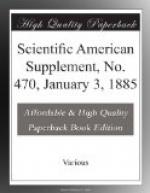This was a typical instance of the way in which invention was encouraged in America. Why should it be otherwise here? For many years literary property had received a protection which was yet to be desired for patented invention. Not only for fourteen years, but for the duration of a man’s life, was that kind of brain property protected, and even after his death his heirs still continued to derive benefit from it. Should a romance or a poem be deemed more worthy of reward than the labors of those inventors to whom he had referred, and which certainly produced far greater and more abiding advantage to the nation? To secure a due appreciation of the whole importance of invention, no other means could be adopted than that which the institute had been formed to secure, namely, the union of inventors, not only of one nation, but of the whole world. The international character of the subject had been recognized by the institute, and they had never neglected any opportunities of pressing that view of the subject, which had at last obtained some recognition from our government.
No great result could, however, be expected from a congress where inventors, not lawyers or patent agents, still less officials trained in a vicious routine, formed the majority. It might be hoped that next year there would arise an opportunity for such a congress, and that the institute would do its best to improve the occasion. There never had been a time when England more required the creation of new industries. Our agriculturists had signally failed to hold their own in the face of unlimited competition, and the food of the nation no longer came from within. But if that were the case, then some means must be found of paying for the food imported from abroad, and this could only be done by constant improvement in manufactures, or some change by which we might sell some of our other productions at a profit if the food could not be produced but at a loss. Here invention might fitly be called to aid, but could only respond if all restrictions were removed and every facility granted.
Capital must be induced to consider that home investments are more remunerative and not less secure than any others, and this could only be done by adding to the security of the property proposed for investment. He had referred to the unlimited nature of the property created by invention, and they would infer that if properly protected there was equally no limit to the capital that could be profitably employed in developing such property. The institute did not exist solely or even mainly for the purpose of advocating the claims of inventors to consideration, either individually or collectively, but for the great object of forcing home upon the convictions of the people the fact that at the very foundation of the wealth and prosperity of every nation lies the intelligence, the skill, the honesty, and the self-denial of its sons.




